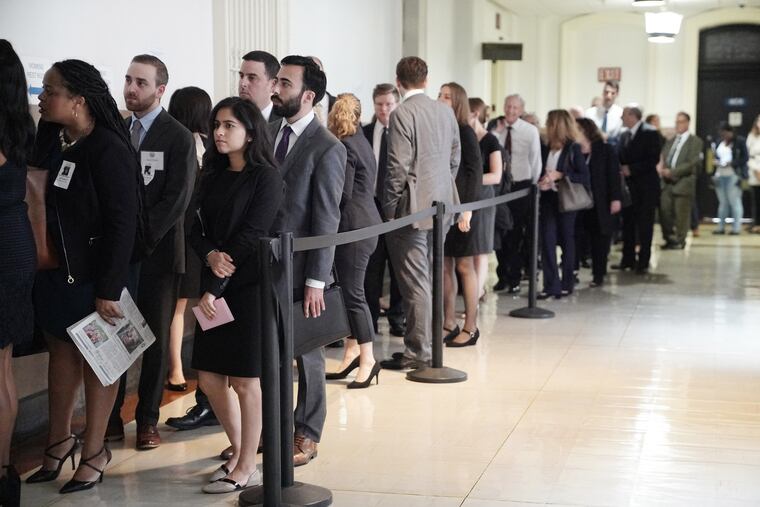Pa. high court hears arguments in Philly over constitutionality of death penalty
The Philly DA's Office sided with federal defenders in arguing that the death penalty is unreliable, cruel, and unconstitutional.

In a packed Philadelphia City Hall courtroom, with dozens more observers watching from a nearby overflow room, lawyers on Wednesday argued before the state Supreme Court over whether it should invoke its power to rule on the constitutionality of the death penalty.
Timothy Kane, an assistant federal defender for the Federal Community Defender Office in Philadelphia, which represents death-row inmates Jermont Cox and Kevin Marinelli, argued before the seven justices that many death-penalty sentences in the state over the last 40 years have been overturned, which he said is a sign that the system is unreliable and thus violates the state constitution’s ban on cruel punishment.
“If the system is cruel, it’s incumbent for this court to say so,” Kane argued.
The Philadelphia District Attorney’s Office also contended that the death penalty, as applied, has been unreliable and is thus unconstitutional.
“The touchstone depends on its reliability,” argued Paul George, assistant supervisor of the DA’s Law Division, who referred to a recent study by his office that found that 112 of 155 death-penalty sentences — or 72 percent — from 40 years through 2017 were overturned. Most were overturned because the defendants had ineffective counsel, he said.
George, like Philadelphia District Attorney Larry Krasner, is a former criminal defense attorney who has opposed the death penalty. Krasner, who took office in January 2018, had campaigned on “never” seeking the death penalty. In practice, the DA’s Office under Krasner has agreed or signaled a willingness to vacate the death penalty for more than one-third of the 45 inmates from Philadelphia then on death row, an Inquirer analysis in May showed. The DA’s Office had not yet had to respond to other inmates’ sentencing appeals at that time.
The case Wednesday before the state Supreme Court centered on a petition filed by the federal defenders in August 2018 on behalf of Cox, of Philadelphia, and Marinelli, of Northumberland County, but could affect the approximately 130 other inmates on death row in the state. The defenders in their petition cited the June 2018 Joint State Government Commission report, which found cause for grave concern in the death penalty, as the reason why the court should find that the death penalty violates the state constitution’s ban on cruel punishment.
The federal defenders are asking the high court to address systemic problems with the death penalty and to abolish its use in the state. The court has the power to review an issue of public importance that requires timely intervention.
The Philadelphia DA’s Office represents the commonwealth in Cox’s case, but the state Attorney General’s Office represents the commonwealth in Marinelli’s case.
Ronald Eisenberg, senior appellate counsel in the AG’s Office, argued before the justices that there was no immediate need and there are other avenues to address issues raised.
He noted that if lawyers on capital cases are found to be ineffective, “we do not advocate for the reappointment of those lawyers,” and suggested that there be some type of remediation process for them. He also said that there could be a way to better fund court-appointed attorneys.
Matt Haverstick, an attorney representing State Senate President Pro Tempore Joe Scarnati (R., Jefferson) and 12 other senators, told the justices that the Joint State Government Commission report was “advisory only.”
He contended that if such legislative reports become evidence for appeals by litigants, legislators would stop issuing them.
The justices did not indicate when they might rule on the matter.
At one point during Kane’s argument, Justice Max Baer told him that it “sounds like you want us to legislate.”
To that, Kane replied that his office wants the court “to absolutely fix” the problem, arguing that the death penalty is cruel and applied arbitrarily.
Cox was convicted of three separate drug-related murders in Philadelphia in 1992 and ordered to die for one of them. Marinelli was sentenced to death for a 1994 killing in Northumberland County.
Both the federal defenders and Philadelphia DA Krasner have also argued that the death penalty is unconstitutional because it is biased against minorities, particularly African Americans.
Justice Kevin Dougherty, a former Philadelphia judge, asked Kane to discuss how the death penalty was unconstitutional “as applied,” and noted that Marinelli is white and his victim was white. Kane argued that Marinelli, like Cox, had court-appointed counsel and contended that Northumberland County has pursued the death penalty often. (Cox is African American.)
Pennsylvania’s death penalty has been used three times since it was reinstated by the state in 1978. The last person executed was Gary Heidnik of Philadelphia in 1999.
Gov. Tom Wolf in 2015 imposed a moratorium on the death penalty in Pennsylvania.
Three other states — California, Colorado, and Oregon — also have a moratorium on the death penalty. Nationwide, 29 states have the death penalty, while 21 others have abolished it, according to the Death Penalty Information Center.